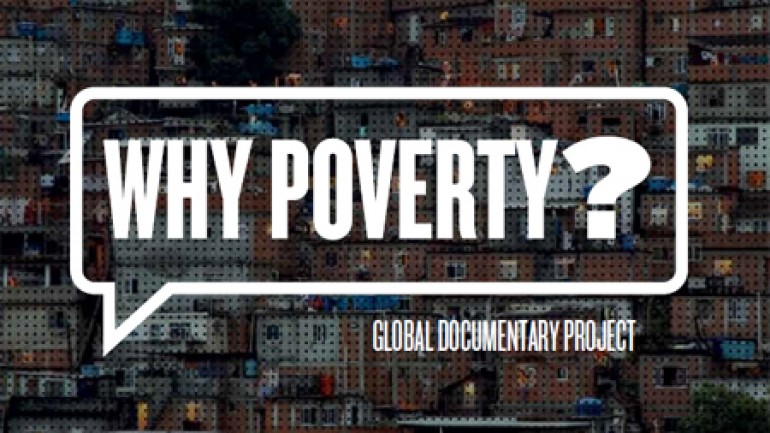From the Authors: Why Poverty? uses film to get people talking about poverty.
We commissioned eight documentaries from award-winning film makers and 30 shorts from new and emerging talents. The films are moving, subtle and thought-provoking stories, but they also tackle big issues and pose difficult questions.
The films were shown around the world in November 2012 on more than 70 national broadcasters. The documentaries are now all free to view online. We’ll make them available on DVD and in languages other than English soon. We’ll also be adding educational resources to help people use them as teaching tools.
Our agenda
We’re not a campaigning organisation. We don’t want money. We’re not pushing for a single, specific solution to global poverty.
We do want people to think and ask questions. What is it like to live in poverty? How does it shape you? Why are people still hungry? Why does it matter? What can I do to change the situation?
If you want to find out more about the issues or how you can get involved, there’s more information across the site about the questions raised in the films and links to in-depth resources and organisations working in these areas.





Unfortunately the video 1/8 did not go to the root cause of the problem. Problem is the central bank. Look at the blog site at https://whythereispoverty.wordpress.com/ for the real problem. Only then you will know how to solve the problem.
Great collection – thanks!
I was able to watch the first 6 films, then part of the 7th, then an error occured.
1) The richest Americans on Park Avenue, who they are and how they got there. Compared to the poverty-stricken people of Sierra Leon. (Very good but upsetting) The women exist just to have children and it is their job to feed them because the men can’t be bothered.
2) How Bono and Geldof raised awareness and tried to help Etheopians. (Hard to watch footage of the famine) Lots of politicking involved and red tape. Some Etheopians resented the interference.
3) Education in China; The private so-called colleges that are ripping off the poor. Simple country people are spending thousands to get their kids into college, if they can’t get into the cheap but legitimate state run universities.
4)Land Rush- Richer countries buying up land in Mali, and displacing subsistence farmers. Their own government sells their farmlands out from under them.
5)Solar Mamma- Aprogram where poor illiterate women in Jordan are recruited to learn how to become solar engineers in India. (This was my favorite). Their husbands don’t want their wives to be educated or to become the providers for their families.
6)Stealing Africa-The mining of copper by Glencore in Zambia, making everyone rich but the citizens. Lots of blah, blah, blah, about tax avoiding and transfer pricing).
There’s no way you can watch all these in one day, but some of them were quite interesting.
The Mali film makes me wonder what happened to these farmers since the Shia Muslims tried to take over and enforce their own laws.
7) Poor Us-Animated history of poverty from ancient man to? It quit on me after 10 minutes.
8/10
– As a whole, the 8 episodes do a good job of discussing poverty. The history, theory, causes, and cures are discussed, but not necessarily in a detailed or summarized way.
– Each episode is not always explicit about how it’s about poverty, for example “Solar Mamas” is nearly a docu-drama in its depiction of joblessness, women’s rights, and political manipulation of the poor.
– The episodes are more different from each other than I expected them to be, which I suppose goes to show that poverty is a very large topic.
– The episodes do not build up any particular themes, but discuss poverty from different viewpoints than before.
– There are no particular causes blamed for poverty, but corruption and conquest are included as large players.
– There are no particular cures offered for poverty, rather there is some discussion of the failure of previous attempts.
– The background audio occasionally drowns out the narration enough to be a problem, but only for maybe a minute per episode on average.
The main causes of poverty are human population explosion and human stupidity. The best ways to stop poverty is human population control and eugenics.
“At some future period, not very distant as measured by centuries, the civilised races of man will almost certainly exterminate and replace throughout the world the savage races.” – Charles Darwin (in Descent of Man)
Average IQ levels according to Richard Lynn: Ashkenazi Jews (110), East Asians = Mongoloids (105), Europeans (99), Inuit (91), Southeast Asians and Amerindians (87 each), Pacific Islanders (85), South Asians/North Africans including Middle Easterners (84), Non-Bushmen Sub-Saharan Africans = Bantus (67), Australian Aborigines (62), Bushmen and Pygmies (54), Homo Erectus (50), Apes (22), and Monkeys (12).
“A 60-page review of the scientific evidence has concluded that race differences in average IQ are largely genetic.” source: http://www.news-medical.net/news/2005/04/26/9530.aspx
Please, take this racist junk elsewhere. Besides, your quoting Darwin is absolutely hilarious considering that the man had some pretty crucial and yet unanswered questions in his “theory”.
Maybe you`d like to expand your knowledge a bit on Darwinism and why it is such a weak and ridiculous attempt at explaining God`s creation.
I will not even comment on the IQ level garbage you posted because, really, just reading it made me want to vomit.
Back in my History classes in college I learned about such ludicrous “theories” and, deep in my heart, I hoped no one now would even believe this hogwash.
But, apparently, someone still does.
You are a idiot towelhead 🙂